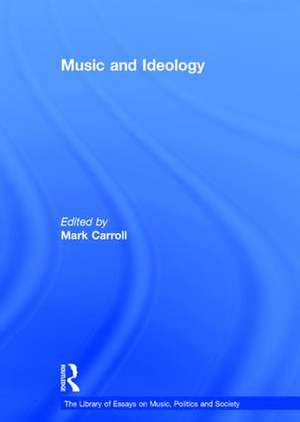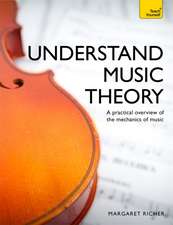Music and Ideology: The Library of Essays on Music, Politics and Society
Editat de Mark Carrollen Limba Engleză Hardback – 28 oct 2012
| Toate formatele și edițiile | Preț | Express |
|---|---|---|
| Paperback (1) | 229.98 lei 6-8 săpt. | |
| Taylor & Francis – 14 oct 2024 | 229.98 lei 6-8 săpt. | |
| Hardback (1) | 514.09 lei 6-8 săpt. | |
| Taylor & Francis – 28 oct 2012 | 514.09 lei 6-8 săpt. |
Preț: 514.09 lei
Preț vechi: 675.68 lei
-24% Nou
Puncte Express: 771
Preț estimativ în valută:
98.38€ • 106.83$ • 82.64£
98.38€ • 106.83$ • 82.64£
Carte tipărită la comandă
Livrare economică 22 aprilie-06 mai
Preluare comenzi: 021 569.72.76
Specificații
ISBN-13: 9781409429685
ISBN-10: 1409429687
Pagini: 614
Dimensiuni: 174 x 246 mm
Greutate: 1.41 kg
Ediția:1
Editura: Taylor & Francis
Colecția Routledge
Seria The Library of Essays on Music, Politics and Society
Locul publicării:Oxford, United Kingdom
ISBN-10: 1409429687
Pagini: 614
Dimensiuni: 174 x 246 mm
Greutate: 1.41 kg
Ediția:1
Editura: Taylor & Francis
Colecția Routledge
Seria The Library of Essays on Music, Politics and Society
Locul publicării:Oxford, United Kingdom
Cuprins
Contents: Introduction; Music and ideology: Rameau, Rousseau, and 1789, Charles B. Paul; The French musical theater: maintaining control in Caribbean colonies in the 18th-century, David M. Powers; Mozart and Freemasonry, Katharine Thomson; Beethoven’s political music, the Handelian sublime, and the aesthetics of prostration, Nicholas Mathew; Deconstructing a ’national composer': Chopin and Polish exiles in Paris, 1831-49, Jolanta T. Pekacz; On Ruslan and Russianness, Marina Frolova-Walker; Music in Paris during the Franco-Prussian war and the Commune, Jess Tyre; The old lie, Glenn Watkins; The composer as intellectual: ideological inscriptions in French interwar neoclassicism, Jane F. Fulcher; The distorted sublime: music and National Socialist ideology - a sketch, Reinhold Brinkmann; What is ’Nazi music’?, Pamela M. Potter; Public lies and unspeakable truth interpreting Shostakovich’s 5th symphony, Richard Taruskin; Beyond the folk song: or, what was Hungarian Socialist Realist music?, Danielle Fosler-Lussier; Ike gets Dizzy, Penny M. Von Eschen; Born under a bad sign, Robin Denselow; Rock and the politics of memory, Simon Frith; Appropriating the master’s tools: Sun Ra, the Black Panthers and Black consciousness, 1952-1973, Daniel Kreiss; Music under Mao, its background and aftermath, Mao Yu Run; Power, authority and music in the cultures of Inner Asia, Jean During; As Plato duly warned: music, politics and social change in coastal East Africa, Kelly M. Askew; African music, ideology and utopia, Nick Nesbitt; Brechtian hip-hop: didactics and self-production in post-Gangsta political mixtapes, George Ciccariello Maher; Political music and the politics of music, Lydia Goehr; Name index.
Notă biografică
Mark Carroll is Associate Professor, Elder Conservatorium and Dean (Research), Faculty of Humanities and Social Sciences, University of Adelaide, Australia.
Descriere
This volume gathers together a cross-section of essays and book chapters dealing with the ways in which musicians and their music have been pressed into the service of political, nationalist and racial ideologies. Arranged chronologically according to their subject matter, the selections cover Western and non-Western musics from the eighteenth century to the present day, as well as art and popular musics, and contribute significantly to our understanding of the use and abuse of music for ideological ends.













